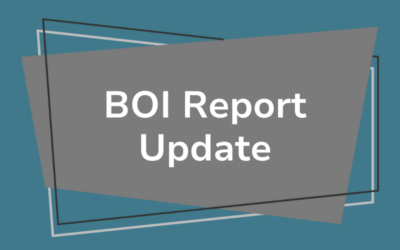Texas Comptroller Annual Franchise Tax Reports Requirements
If you have a business in the Lone Star state, you may be wondering if you must file a Texas annual franchise tax report and pay a franchise tax. The state’s report filing requirements vary according to the type of business entity, so it’s important to research what obligations your business does (or does not) need to fulfill.
Most domestic entities (for example, companies registered as LLCs or corporations in Texas) and foreign entities (companies registered in a different home state but conducting business in Texas) need to submit a Texas Franchise Tax Report and possibly pay a franchise tax. The annual due date is May 15.
In this article, you’ll find some general information to help entrepreneurs begin to understand their responsibilities regarding what filings they might need to submit to the Texas Comptroller’s office. Because state reporting rules can have financial and legal impacts, it’s wise for business owners to speak with their attorneys and accountants or tax advisors for professional guidance specific to their situation.
Due Date Extension for 2021
Because of the severe weather that Texans experienced in February of 2021, the Texas Comptroller of Public Accounts has extended the due date for 2021 Texas franchise reports and payments to June 15, 2021.
The comptroller’s website shares that the extension is automatic for all taxpayers. Hence, there are no additional forms required to get the extended due date. “The due date extension applies to all taxpayers. The extension is automatic, and taxpayers do not need to file any additional forms.”
Due Dates:
- If taxpayers cannot file by the extended due date, they must file an extension request by June 15 and pay 90% of the tax due for the current year or 100% of the tax reported in the prior year.
- Non-electronic funds transfer taxpayers who are granted an extension have until November 15, 2021 to file their report and pay the remaining tax amount due.
- Electronic funds transfer (EFT) taxpayers who are granted an extension have until August 16, 2021 to file and pay the remaining tax amount due.
- EFT taxpayers have the option of requesting a second extension to move their filing deadline to November 15, 2021. They must file that second extension request on or before August 16, 2021. At the same time, they must pay their remaining tax amount due. Their report deadline gets extended to November 15, but the balance of their tax obligation must be paid by August 16.
About the Texas Franchise Tax Report
The franchise tax is a privilege tax imposed on entities formed, organized, or doing business in Texas. Limited partnerships, limited liability partnerships, C corporations, and limited liability companies in Texas with a taxable margin of over $1,180,000 are among the entities usually subject to franchise tax in Texas. The calculation of tax due must be reported on a Texas Franchise Tax Report.
As of 2020, the Comptroller’s office began requiring businesses with no physical presence in Texas to pay the franchise tax. “A foreign taxable entity with no physical presence in Texas now has nexus if, during any federal accounting period ending in 2019 or later, it has gross receipts from business done in Texas of $500,000 or more. Additionally, a foreign taxable entity with a Texas use tax permit is presumed to have nexus and is subject to Texas franchise tax.”
Sole proprietorships and general partnerships, which are not formally registered business entities, do not have to pay franchise tax in Texas. Also, businesses considered “passive entities,” those with zero Texas gross receipts, qualified Real Estate Investment Trusts, and pre-qualified new veteran-owned businesses are not subject to the franchise tax.
Franchise Tax Rates:
- .375% – Retail or wholesale businesses
- .75% – Other businesses
- .331% – Taxable entities with annualized total revenue of $20 million or less have the option to compute the annual tax by multiplying total revenue by the apportionment factor (single-factor apportionment formula to calculate gross receipts in Texas) and then multiplying the apportioned total revenue by a tax rate of 0.331%.
There are nuances and exceptions to the Franchise Tax rules, so it can be beneficial for business owners to talk with a tax advisor or accountant who has a firm understanding of the Texas tax code.
Texas Franchise Public Information Reports
Businesses subject to the Texas franchise tax must file these reports with the Texas Comptroller of Public Accounts when paying their franchise tax.
Entities Required to File Public Information Reports (PIRs):
- Corporations
- Limited Liability Companies (LLCs)
- Limited Partnerships
- Professional Associations
- Financial Institutions
Information Collected on the PIR:
- Taxpayer number
- Taxpayer name and mailing address
- Secretary of State file number or Comptroller file number
- Principal office
- Principal place of business
- Names, titles, term dates, and mailing addresses of the officers, directors, members, general partners, or managers of the entity
- Owned entities information (if the entity owns an interest of 10% or more in any subsidiaries)
- Information about any parent entities that own interest of 10% or more of the filing entity
- Registered agent information
The Texas Comptroller’s office does not charge entities a fee to file their Public Information Report.
Texas Franchise Ownership Information Reports
Entities required to File Ownership Information Reports (OIRs):
According to the Texas Comptroller’s website, “entities other than Corporations, Limited Liability Companies, Limited Partnerships, Professional Associations or Financial Institutions” must file an Ownership Information Report. For example, Limited Liability Partnerships (LPs registered as LLPs with the Secretary of State office) and Trusts must file this report.
Information Collected on the OIR:
- Taxpayer number
- Taxpayer name and mailing address
- Secretary of State file number or Comptroller file number
- Owner Information for each general partner of a partnership, trustee of a trust, and each person or entity that owns an interest of 10% or more of the filing entity
- Information about any subsidiary of which the filing entity owns an interest of 10% or more
- Registered agent information
There is no fee from the Texas Comptroller’s office to file an Ownership Information Report.
In addition to the Ownership Information Report to the Comptroller, LLPs must also submit an Annual Report to the Texas Secretary of State. That report is due by June 1 of each year with a $200 per general partner filing fee.
Periodic Report of a Nonprofit Corporation
Tax-exempt nonprofit corporations must submit a Periodic Report to the Texas Secretary of State office, not more than once every four years. Typically, the state will notify the nonprofit’s registered agent to notify when the report is required. The state fee for filing this report is $5.
Also, limited partnerships that are not subject to franchise tax are required to file a periodic report. The filing fee for LPs is $50.
Texas Franchise Tax No Tax Due Information Report
A business can qualify to file the Texas Franchise Tax No Tax Due Report if any of the following statements are true:
- The entity has annualized total revenues less than or equal to the State’s current “no tax due threshold.” For 2021, that revenue threshold is $1,180,000.
- The entity has no Texas receipts.
- The business is considered a “passive” entity (per Chapter 171 of the Texas Tax Code).
- The business is a real estate investment trust.
There is no fee from the Texas Comptroller’s office to file a No Tax Due Information Report.
How and When to File Your Reports
Business owners should talk with an attorney, accountant, or tax advisor for professional expertise about their reporting and franchise tax responsibilities.
New business entities must file their first annual report and pay franchise tax by May 15 of the year following their formation filing. For example, if a Texas LLC is formed in August 2021, its first Public Information Report and Franchise Tax filing will be due by May 15, 2022.
As I mentioned earlier, the Texas Comptroller has extended its 2021 franchise report and tax due date from May 15 to June 15 to provide some relief during the coronavirus pandemic. That extension is automatic, requiring no special requests from businesses. Payments made after August 15 will be subject to penalty and interest. Companies that need additional time can find information on the Comptroller’s website about requesting an extension.
Businesses can submit their annual reports and pay franchise taxes electronically through the Texas WebFile system. The State provides video tutorials of the process. However, filing reports and taxes in Texas can be confusing to those unfamiliar with the process.
Stay Compliant with CorpNet’s Help
To alleviate the stress of figuring out the paperwork on your own, ask my team of filing experts at CorpNet for assistance. CorpNet can ensure that you fulfill your obligations by helping you prepare and submit your filings.
We work with business owners in all 50 states, Texas included. Get the peace of mind that your annual reports, franchise tax filings, and other compliance forms will be completed accurately and on time! Contact us now to get a jump on your upcoming requirements!
Resources and References:
https://comptroller.texas.gov/taxes/publications/98-806.php
https://comptroller.texas.gov/help/franchise/information-report.php?category=taxes
https://comptroller.texas.gov/taxes/franchise/
https://comptroller.texas.gov/taxes/franchise/forms/2021-franchise.php
https://comptroller.texas.gov/taxes/franchise/filing-requirements.php
https://statutes.capitol.texas.gov/Docs/TX/htm/TX.171.htm#171.106
https://texreg.sos.state.tx.us/public/readtac$ext.TacPage?sl=R&app=9&p_dir=&p_rloc=&p_tloc=&p_ploc=&pg=1&p_tac=&ti=34&pt=1&ch=3&rl=591





